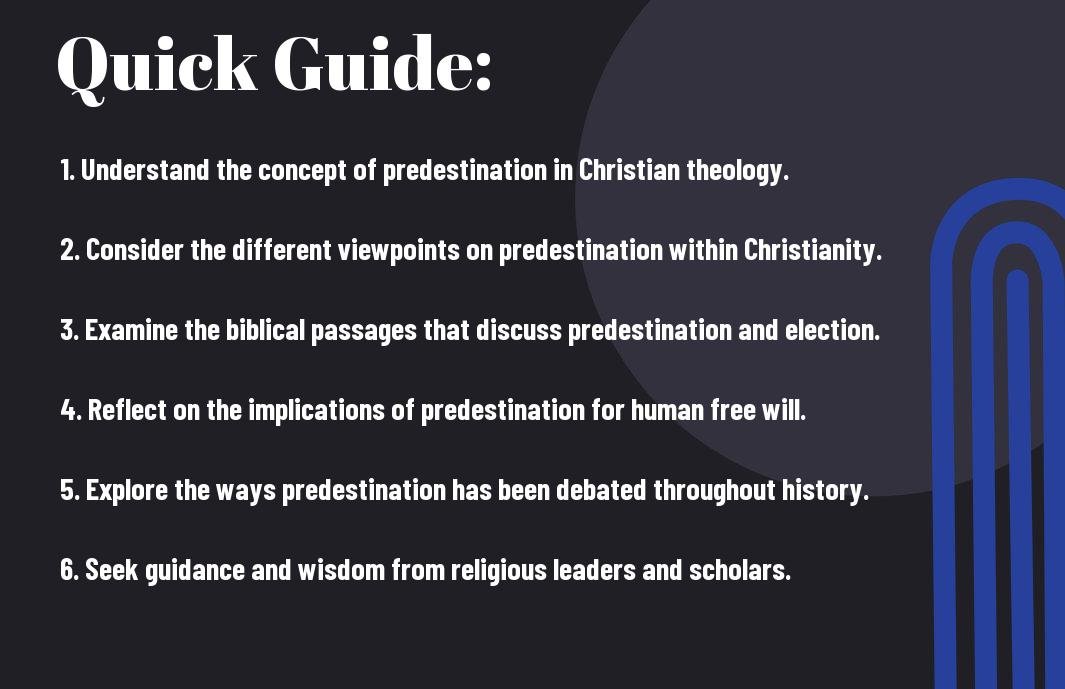Have you ever pondered the mystery of predestination and wondered why God chooses some individuals for salvation and not others? This theological concept has sparked debate and fascination within Christian circles for centuries. As I delve into this complex and controversial topic, I will provide insight into different interpretations of predestination, explore the implications for faith and salvation, and offer practical guidance for personal belief and spiritual growth. Whether you are firmly committed to a specific doctrine or simply seeking understanding, this discussion will challenge and enlighten your perspective on God’s sovereignty and the mystery of divine election.
Key Takeaways:
- Predestination is a mysterious and heavily debated theological concept that has been the subject of intense discussion for centuries.
- God’s choice of some individuals for salvation and not others is believed by some to be predetermined before the foundation of the world.
- The debate over predestination centers around the tension between God’s sovereignty and human free will.
- Various interpretations of predestination exist within Christianity, including Calvinism, Arminianism, and Molinism.
- Ultimately, the mystery of predestination invites Christians to engage in humble dialogue and seek a deeper understanding of God’s ways.
The Mystery of Predestination
The concept of predestination has long been a topic of mystery and debate within religious circles. It raises questions about the nature of God’s sovereignty and the free will of human beings. The idea that God chooses some for salvation and not others can be a difficult and unsettling concept to grapple with.
The Theological Debate
The theological debate surrounding predestination centers on the tension between God’s sovereignty and human free will. Some theologians argue that God’s foreknowledge of all events means that he has already chosen who will be saved, while others believe that humans have the freedom to choose their own salvation.
Types of Predestination
There are various types of predestination that have been discussed throughout history. These include unconditional predestination, conditional predestination, and single predestination versus double predestination.
- Unconditional predestination: God’s decision to save individuals without any conditions or qualifications.
- Conditional predestination: God’s decision to save individuals based on certain conditions or criteria.
- Single predestination: God’s predestination of individuals for salvation.
- Double predestination: God’s predestination of individuals for both salvation and damnation.
Knowing and understanding the nuances of these different types of predestination can provide valuable insight into the theological complexities of the concept.
| Unconditional predestination | God’s decision to save individuals without any conditions or qualifications. |
| Conditional predestination | God’s decision to save individuals based on certain conditions or criteria. |
| Single predestination | God’s predestination of individuals for salvation. |
| Double predestination | God’s predestination of individuals for both salvation and damnation. |
Factors Influencing Predestination
Obviously, the concept of predestination is complex and involves multiple factors that influence its understanding and interpretation. Some of the factors that play a significant role in predestination include
- divine sovereignty
- human free will
- God’s foreknowledge
- the nature of sin
Recognizing the interplay of these factors is crucial in comprehending the mystery of predestination.
Divine Sovereignty
God’s sovereignty is a pivotal aspect in the debate on predestination. The belief in divine sovereignty asserts that God is all-powerful and in control of all things. This includes the ultimate destiny of individuals, as God possesses the authority to predestine certain people for salvation. This notion emphasizes the absolute power and control of God in determining the eternal fate of individuals.
Human Free Will
On the other hand, the concept of human free will presents a contrasting viewpoint. It argues that humans have the freedom to make their own choices, including the decision to accept or reject God’s offer of salvation. This belief underscores the responsibility and autonomy of individuals in determining their eternal destiny. The tension between divine sovereignty and human free will is at the core of the predestination debate, shaping differing theological perspectives and interpretations of this complex doctrine.
Pros and Cons of Predestination
Now let’s take a closer look at the pros and cons of the concept of predestination. This will help us understand the debate surrounding this theological belief and the impact it has on individuals and their relationship with God.
| Pros | Cons |
| Provides a sense of security and assurance in God’s plan | Raises questions about free will and personal responsibility |
| Emphasizes God’s sovereignty and control over all things | Can lead to feelings of fatalism and a lack of motivation |
| Offers comfort in times of difficulty and suffering | Raises concerns about the fairness and justice of God |
| Encourages humility and reliance on God’s grace | Creates tension in understanding the nature of God’s love for all |
Benefits of Understanding Predestination
Understanding the concept of predestination can bring a sense of security and assurance in God’s plan for your life. You can find comfort in knowing that God has a specific purpose for you and that nothing happens outside of His control. This can lead to a deep sense of peace and trust in the midst of life’s uncertainties.
Criticisms and Concerns
On the other hand, there are valid criticisms and concerns surrounding the idea of predestination. Some argue that it raises questions about free will and personal responsibility. If everything is predetermined by God, then where does human choice come into play? This can lead to feelings of fatalism and a lack of motivation to actively participate in shaping one’s own destiny.

Conclusion: The Mystery and Debate of Predestination
To wrap up, the concept of predestination is a complex and contentious topic that has sparked debates and discussions for centuries. While some may believe that God chooses certain individuals for salvation while others are predestined for damnation, others argue that free will and personal choice play a significant role in determining one’s spiritual destiny. Despite the differing perspectives, it is essential to acknowledge the mystery surrounding predestination and approach this theological concept with humility and respect. Ultimately, the understanding of God’s sovereign will and human responsibility is an intricate and profound theme that requires careful study and reflection.
FAQ
Q: What is the concept of predestination in Christianity?
A: The concept of predestination in Christianity refers to the belief that God has foreordained all that will happen, including the eternal destiny of individuals. This includes the idea that God has chosen some individuals for salvation and others for damnation.
Q: What is the basis for the belief in predestination?
A: The belief in predestination is based on the teachings of the Bible, particularly in the writings of the Apostle Paul, who speaks of God’s sovereign choice and predestination of individuals to be saved in passages such as Romans 8:29-30 and Ephesians 1:4-5.
Q: How does predestination coexist with free will?
A: The relationship between predestination and free will has been a subject of debate within Christianity. Some theologians argue that God’s predestination does not negate human free will, but rather works alongside it in a way that is ultimately mysterious and beyond human understanding.
Q: Why does God choose some individuals for salvation and not others?
A: The question of why God chooses some individuals for salvation and not others is a mystery that has been debated throughout Christian history. Some believe in the concept of “double predestination,” where God not only predestines some for salvation, but also others for damnation. Others believe that God’s reasons for choosing certain individuals are ultimately unknown and beyond human comprehension.
Q: How should believers approach the concept of predestination?
A: Believers should approach the concept of predestination with humility and reverence, recognizing that it is a profound theological mystery. While the debate over predestination is important, it is also crucial for believers to focus on living out their faith in love, obedience, and service to God and others, rather than becoming consumed by theological disputes.

